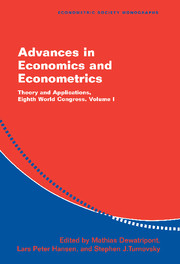Book contents
- Frontmatter
- Contents
- List of Contributors
- Preface
- 1 Auctions and Efficiency
- 2 Why Every Economist Should Learn Some Auction Theory
- 3 Global Games: Theory and Applications
- 4 Testing Contract Theory: A Survey of Some Recent Work
- 5 The Economics of Multidimensional Screening
- A Discussion of the Papers by Pierre-Andre Chiappori and Bernard Salanié and by Jean Charles Rochet and Lars A. Stole
- 6 Theories of Fairness and Reciprocity: Evidence and Economic Applications
- 7 Hyberbolic Discounting and Consumption
- A Discussion of the Papers by Ernest Fehr and Klaus M. Schmidt and by Christopher Harris and David Laibson
- 8 Agglomeration and Market Interaction
- 9 Nonmarket Interactions
- Index
6 - Theories of Fairness and Reciprocity: Evidence and Economic Applications
Published online by Cambridge University Press: 19 January 2010
- Frontmatter
- Contents
- List of Contributors
- Preface
- 1 Auctions and Efficiency
- 2 Why Every Economist Should Learn Some Auction Theory
- 3 Global Games: Theory and Applications
- 4 Testing Contract Theory: A Survey of Some Recent Work
- 5 The Economics of Multidimensional Screening
- A Discussion of the Papers by Pierre-Andre Chiappori and Bernard Salanié and by Jean Charles Rochet and Lars A. Stole
- 6 Theories of Fairness and Reciprocity: Evidence and Economic Applications
- 7 Hyberbolic Discounting and Consumption
- A Discussion of the Papers by Ernest Fehr and Klaus M. Schmidt and by Christopher Harris and David Laibson
- 8 Agglomeration and Market Interaction
- 9 Nonmarket Interactions
- Index
Summary
INTRODUCTION
Most economic models are based on the self-interest hypothesis that assumes that all people are exclusively motivated by their material self-interest. Many influential economists – including Adam Smith (1759), Gary Becker (1974), Kenneth Arrow (1981), Paul Samuelson (1993), and Amartya Sen (1995) – pointed out that people often do care for the well-being of others and that this may have important economic consequences. Yet, so far, these opinions have not had much of an impact on mainstream economics. In recent years, experimental economists have gathered overwhelming evidence that systematically refutes the self-interest hypothesis. The evidence suggests that many people are strongly motivated by other-regarding preferences, and that concerns for fairness and reciprocity cannot be ignored in social interactions. Moreover, several theoretical papers have been written showing that the observed phenomena can be explained in a rigorous and tractable manner. Some of these models shed new light on problems that have puzzled economists for a long time (e.g., the persistence of noncompetitive wage premia, the incompleteness of contracts, the allocation of property rights, the conditions for successful collective action, and the optimal design of institutions). These theories in turn induced a new wave of experimental research offering additional exciting insights into the nature of preferences and into the relative performance of competing theories of fairness. The purpose of this paper is to review these recent developments, to point out open questions, and to suggest avenues for future research. Furthermore, we will argue that it is not only necessary, but also very promising for mainstream economics to take the presence of other-regarding preferences into account.
- Type
- Chapter
- Information
- Advances in Economics and EconometricsTheory and Applications, Eighth World Congress, pp. 208 - 257Publisher: Cambridge University PressPrint publication year: 2003
- 209
- Cited by



